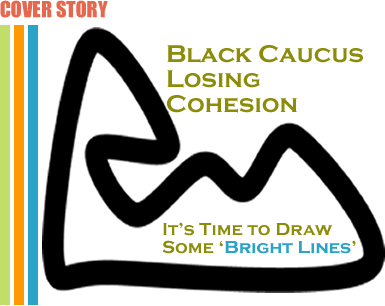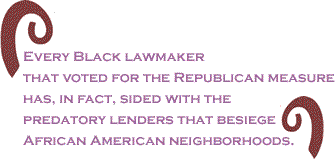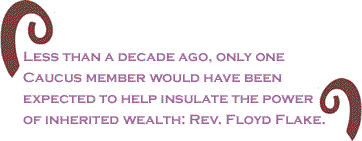
|
|||||||||||||||||||||
 |
The corporate Right has succeeded in establishing a “coalition of the willing” within the Congressional Black Caucus (CBC), as shown by last week’s votes on bankruptcy and estate tax legislation. The defection of ten of 41 voting CBC members to the Republicans on bankruptcy, and eight on repeal of the estate tax signals that corporate-controlled membership in the CBC has reached critical mass, encouraging members who are not part of the Caucus’s conservative core group to betray their constituencies, as well. "The G.O.P. is practicing Robin Hood in reverse," said Rep. John Conyers Jr. (MI), after last week’s lopsided Democratic defeats. "Last night they repealed the estate tax, a gift to the wealthiest individuals in our society. Today they pushed through the special-interest bankruptcy bill, punishing the very poorest members of society.” But Conyers’ critique should apply with doubly damning effect to fellow Caucus members, including three who are also members of the Progressive Congressional Caucus but voted with Republicans on one or the other measure.
The growing rot in the CBC must be viewed in the context
of massive corporate intervention in Black electoral politics, conceived
in rightwing think tanks in the mid-90s and emerging full-blown
in the 2002 election cycle, when Denise Majette (GA), David Scott
(GA), and Artur Davis (AL) won congressional seats. That’s also
the year when rightwing apprentice Cory Booker nearly captured City
Hall in Newark, New Jersey. Although public attention has focused
on the Bush administration’s faith-based bribes to woo Black preachers
to the GOP, the far more dangerous prong of the offensive aims to
subvert Black Democrats from within. Corporate funding and media
support have been placed at the disposal of Black Democrats who
“leave the reservation,” so to speak – i.e., those who reject, at
least selectively, the historical Black Political Consensus. Barely
three years after the corporate intervention was launched (see Voting with the enemy The ten Black lawmakers who helped the credit card
companies feel positively “giddy,” as the New York Times put it,
include the Hard Core Four: Blue Dog Harold
Ford, Jr. (TN) and Artur Davis (AL), who, along with Gregory
Meeks (NY) carried the bankruptcy banner
for the Democratic Leadership Council (DLC); Blue Dog Sanford Bishop
(GA); and the absolutely Worst Black Congressperson (see Also among the Republican fellow-travelers were William Jefferson (LA), who is not a member of the DLC or Blue Dogs, but often votes like it, and DLCer Albert Wynn (MD). (Wynn, along with Ford, Bishop and Jefferson, were among the Four Eunuchs of the Caucus that voted to give George Bush his Iraq War Powers, in October, 2002.)
Florida’s Kendrick Meek, who flirts with the Right on occasion, made common cause with conservatives on bankruptcy, as did freshman Houston Congressman Al Green. Emanuel Cleaver, a first term congressman and former mayor of Kansas City, was one of only two members of the Progressive Caucus – and the only Black – to vote for the bankruptcy bill. Eighteen African American lawmakers also belong to the 50-plus member Progressive Congressional Caucus. Each of the Hard Core Four most consistent Black sell-outs on Capitol Hill – Davis (AL), Ford (TN), Bishop (GA) and Scott (GA) – hails from among the ten states that are hardest hit by bankruptcy. But every Black lawmaker that voted for the Republican measure has, in fact, sided with the predatory lenders that besiege African American neighborhoods. According to a study by the National Community Reinvestment Coalition (NCRC), about 29 percent of African Americans resort to high-cost loans when buying or refinancing their homes – vastly increasing their future risk of bankruptcy. Map overlays provided by the journal Southern Studies show that concentrations of predatory lending facilities hug closely to the contours of Black neighborhoods in Atlanta and Charlotte, for example. On the most fundamental level, the cleavage in the Black Caucus shows the power of corporate money to erode notions of fairness – a rejection of privilege – that are central to the historical Black Political Consensus. "The essential philosophical and political divide over the bankruptcy bill boils down to whether you see filing for bankruptcy as a right or a privilege," John D. McMickle, a former the bankruptcy lawyer for the Senate Judiciary Committee told the Washington Post. "The new law makes bankruptcy a privilege reserved only for people who can prove they can't repay their debts." If nothing else, African Americans expect that their representatives will stand against the privileges of wealth – which, in the United States, are nearly inseparable from white privilege. Instead, ten members of the Congressional Black Caucus sided with finance capital, and against fairness for their constituents and stability for their neighborhoods. Congressional delinquents
Even more than the treatment of people facing bankruptcy, the estate tax is a bedrock issue that separates those who seek social justice from the forces that would reinforce rigid societal stratification. Eight Black Caucus members joined the Walton family, owners of Wal-Mart, in favor of projecting family wealth and class privilege into the far horizons. Depressingly, two additional lawmakers who share Black and Progressive Caucus membership voted to repeal the estate tax: William “Lacy” Clay (MO) and Sheila Jackson-Lee (TX). They were joined by CBC members Edolphus Towns (NY), freshman G.K. Butterfield (NC), and four of the lawmakers who also voted for the bankruptcy bill: Jefferson (LA), Bishop (GA), Scott (GA) and Wynn (MD) – last week’s grand-slam betrayers. Oddly enough, two of the Caucus’s Hard Core Four – Tennessee’s Harold Ford, Jr. and Alabama’s Artur Davis – voted against estate tax repeal, as did bankruptcy bill supporters Gregory Meeks (NY), Kendrick Meek (FL), Al Green (TX) and Emanuel Cleaver (MO). However, it must be noted that less than a decade ago, only one Caucus member would have been expected to help insulate the power of inherited wealth: Rev. Floyd Flake, who represented a Queens, New York district for six terms (1986-1997). Flake stuck out like a sore thumb as the CBC’s most conservative member. He is now a key player in the national Right network, a school privatization profiteer with the title of Senior Fellow at the Manhattan Institute. As such, Flake is a full-time operative in the corporate machine that is driving the rightward tilt among Black politicians – not to be confused with the political leanings of the Black electorate, who remain substantially supportive of the historical Black Political Consensus on issues of social justice, racial progress, the obligations of state and federal government, and peace.
In a dizzyingly short span of time, we have seen the Congressional Black Caucus’s near-unanimity on fundamental issues held dear by the vast majority of African Americans, crumble. This crisis in Black leadership is the result of a sea-change on the Right which –steeped historically in reflexive racism – only about a decade ago finally came to the realization that an alternative Black Democratic leadership might be created through the power of money. The awful crack in the Caucus is proof that the Right’s strategy is working – they are cutting through the CBC like butter, and that is only the most dramatic manifestation of the all-out assault on the Black Political Consensus. It is not due to the charismatic force of their personalities that three of the Hard Core Four (Ford, Davis and Scott) are second, third and fourth, respectively, in corporate contributions (see Techpolitics.org), followed by Louisiana’s William Jefferson, supporter of the bankruptcy bill, estate tax repeal, and Bush’s Iraq War Powers. “Bright lines” must be drawn delineating acceptable political behavior in Black America. Locating the boundaries of such behavior is not difficult: the Black Political Consensus is based on shared history and experience, and it is only in the last few years that corporate America has moved decisively to induce Black politicians to violate the basic tenets of the Consensus. However, it must be recognized that we live in a brand new Black political environment, recently imposed by corporate capital. There will never again be near-unanimity within the Congressional Black Caucus on issues fundamental to a progressive agenda, unless and until mechanisms are forged that punish betrayal and reward the righteous. That means, among many other things, money – and certainly not funding from the likes of BET’s Bob Johnson, George Bush’s Black point man on repeal of the estate tax and Social Security privatization. There is a generation’s worth of work ahead.
|
Your comments are always welcome. Visit the Contact Us page to send e-Mail or Feedback or Click here to send e-Mail to [email protected] e-Mail re-print notice
If you send us an e-Mail message we may publish all or part of it, unless you tell us it is not for publication. You may also request that we withhold your name. Thank you very much for your readership. |
| April 21 2005 Issue 135 |
|||||||||
|
|||||||||
|
|
|||||||||
| Printer Friendly Version | |||||||||
 |
|||||||||
 |
|||||||||
| |
|||||||||
| |
|||||||||




























